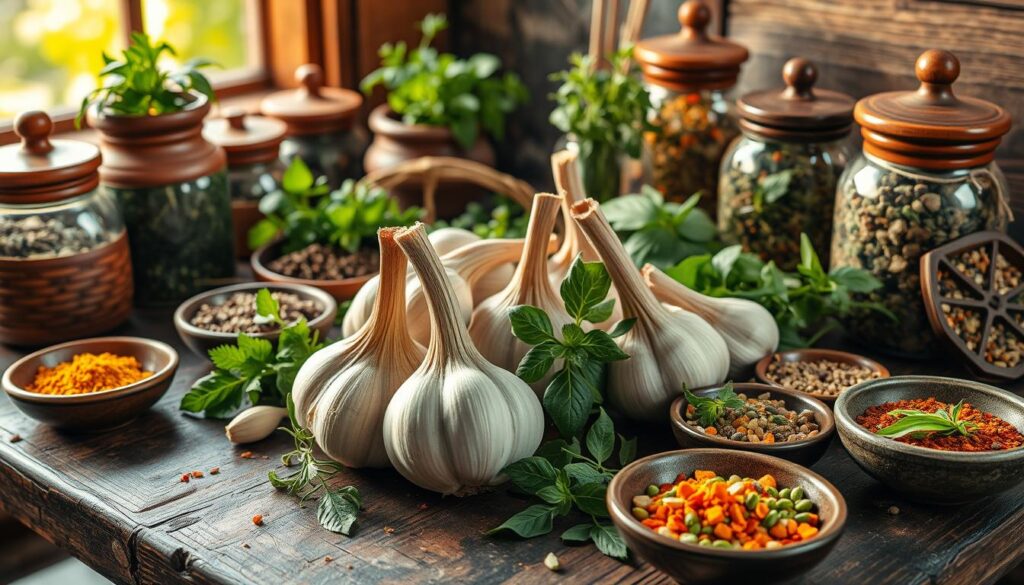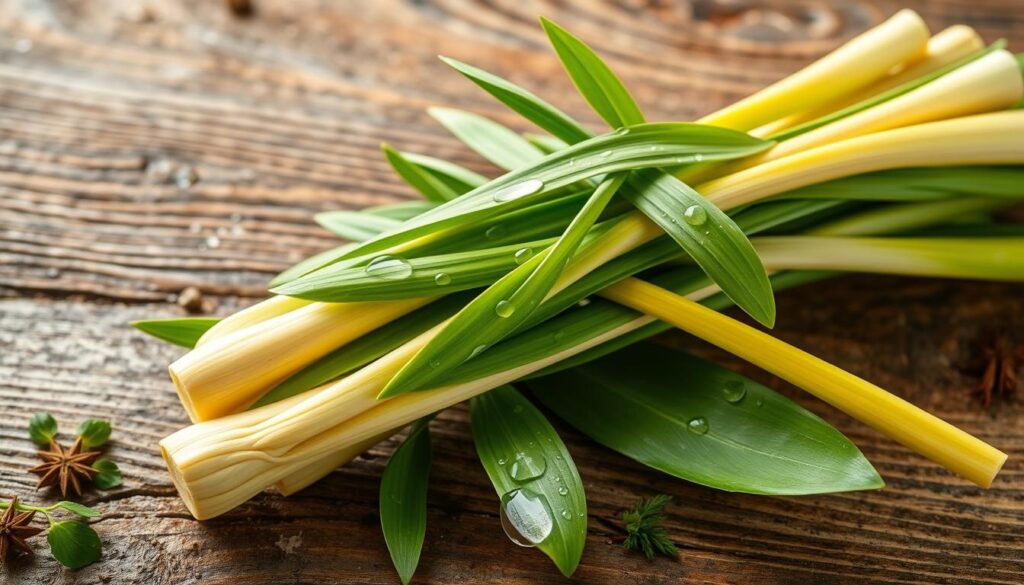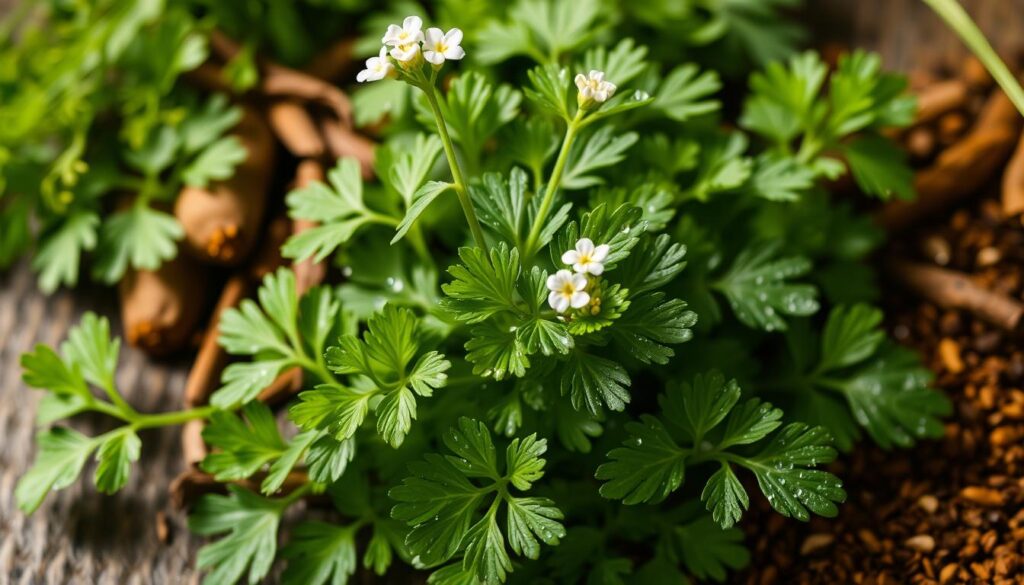Unlock the secrets of traditional Asian remedies and discover the remarkable health benefits of incorporating Asian herbs and spices into your daily life. This comprehensive guide will explore the rich history, culinary uses, and medicinal properties of these natural wonders, empowering you to harness the power of traditional Asian wisdom for your overall well-being.
From the anti-inflammatory prowess of ginger to the antioxidant powerhouse that is turmeric, Asian herbs and spices have long been revered for their ability to promote physical and mental health. These natural seasonings not only elevate the flavors of your favorite dishes but also offer a holistic approach to enhancing your overall quality of life.
Key Takeaways
- Discover the wide-ranging health benefits of Asian herbs and spices
- Learn how to integrate these natural remedies into your culinary and wellness routines
- Explore the historical significance and traditional uses of these powerful plant-based ingredients
- Understand the science behind the medicinal properties of ginger, turmeric, garlic, and more
- Unlock the secrets to boosting your immune system, reducing inflammation, and supporting overall well-being
Introduction to Asian Herbs and Spices
Nestled within the rich culinary traditions of Asia lies a treasure trove of medicinal plants, phytonutrients, and culinary enhancers. These herbs and spices have long been revered for their ability to add depth of flavor, color, and aroma to a wide variety of dishes. However, their benefits extend far beyond the realm of gastronomy, as these botanical wonders possess a remarkable array of health-promoting properties.
What Are Asian Herbs and Spices?
Asian herbs and spices are a diverse group of plant-based ingredients that have been integral to traditional Asian cuisines and medicinal practices for centuries. From the earthy warmth of ginger to the vibrant hues of turmeric, these natural marvels offer a symphony of flavors and a wealth of phytonutrients that can contribute to overall well-being.
Importance in Culinary Traditions
- Enhancing the flavor and aroma of various dishes
- Providing vibrant colors and visual appeal
- Preserving food and extending shelf life
- Blending seamlessly with traditional cooking methods
- Serving as culinary enhancers that elevate the dining experience
Beyond their culinary applications, these medicinal plants have long been recognized for their potential to support human health in a variety of ways. As we delve deeper into the world of Asian herbs and spices, the true scope of their benefits becomes increasingly apparent, making them a valuable addition to any health-conscious lifestyle.
The Healing Properties of Ginger
Ginger, a versatile and aromatic root, has long been celebrated for its remarkable healing properties. This natural seasoning not only enhances the flavors of Asian cuisines but also offers a plethora of health benefits, making it a valuable addition to any wellness routine.
Anti-Inflammatory Benefits
Ginger’s active compounds, such as gingerol and shogaol, possess potent anti-inflammatory effects. These compounds have been shown to inhibit the production of inflammatory substances, helping to alleviate pain and swelling associated with conditions like arthritis, muscle aches, and menstrual cramps. Regular consumption of ginger can support overall joint and muscle health.
Digestive Health
For centuries, ginger has been used in traditional medicine to soothe digestive issues. Studies have demonstrated that ginger can help stimulate the production of digestive enzymes, improve nutrient absorption, and reduce symptoms of indigestion, nausea, and bloating. Whether you’re dealing with occasional stomach discomfort or more persistent gastrointestinal concerns, ginger can be a natural and effective ally.
Immune System Support
Ginger’s anti-inflammatory and antioxidant properties make it a valuable tool for supporting a healthy immune system. The compounds in ginger have been shown to enhance the function of immune cells, helping the body fight off infections and illnesses more effectively. Adding ginger to your diet can be a simple yet powerful way to bolster your natural defenses.

Whether you’re seeking relief from inflammation, digestive distress, or a need to strengthen your immune system, the remarkable healing properties of ginger make it a true natural wonder. Incorporating this versatile root into your culinary and wellness routines can have far-reaching benefits for your overall health and well-being.
Turmeric: The Golden Spice
Turmeric, the vibrant golden spice, has long been revered for its remarkable antioxidant and anti-inflammatory properties. This versatile herb, rich in the compound curcumin, has captured the attention of the health and wellness community for its potential to promote overall well-being.
Curcumin and Its Health Benefits
Curcumin, the active ingredient in turmeric, has been extensively studied for its numerous health benefits. This powerful antioxidant has demonstrated the ability to reduce inflammation, which is a contributing factor to many chronic conditions. By targeting the root cause of inflammation, curcumin may help alleviate symptoms and promote overall health.
Anti-Cancer Properties
Emerging research suggests that the antioxidant properties of turmeric may also play a role in cancer prevention. Curcumin has been shown to inhibit the growth and spread of certain cancer cells, making it a promising natural supplement in the fight against this debilitating disease.
Joint Health and Mobility
For individuals struggling with joint pain and reduced mobility, turmeric may offer a natural solution. The anti-inflammatory effects of curcumin have been associated with improved joint function and reduced discomfort, potentially offering an alternative to traditional pain medications.
“Turmeric’s powerful antioxidant and anti-inflammatory properties make it a versatile natural remedy with the potential to promote overall health and well-being.”
By incorporating turmeric and its active compound, curcumin, into your diet and lifestyle, you may unlock a treasure trove of health benefits, from supporting a healthy inflammatory response to potentially aiding in cancer prevention and joint mobility. Explore the golden possibilities of this remarkable spice and unlock the path to a healthier, more vibrant you.
The Role of Garlic in Health
Garlic, a beloved ingredient in traditional remedies and medicinal plants, has long been revered for its remarkable health benefits. This pungent bulb has been a staple in culinary and holistic practices for centuries, and modern science has validated its remarkable properties.
Cardiovascular Benefits
Numerous studies have demonstrated garlic’s potent ability to support cardiovascular health. Its active compound, allicin, has been shown to help lower blood pressure, improve blood flow, and reduce the risk of heart disease. Regular consumption of garlic has been linked to a decreased incidence of atherosclerosis, the buildup of plaque in the arteries that can lead to heart attacks and strokes.
Immune Boosting Effects
Garlic is a powerful ally in the fight against illness and infection. Its antimicrobial properties make it effective in combating a wide range of bacteria, viruses, and fungi. Garlic has been found to enhance the function of immune cells, helping the body mount a robust defense against various pathogens. Incorporating garlic into your diet can be a natural way to support your overall immune system.
Antimicrobial Properties
Beyond its immune-boosting abilities, garlic’s antimicrobial properties make it a valuable tool in the realm of traditional remedies. Studies have shown that garlic can inhibit the growth of harmful bacteria, such as Staphylococcus aureus and Escherichia coli, making it a natural alternative to synthetic antibiotics. Its versatility in supporting both cardiovascular and immune health underscores the remarkable medicinal potential of this humble bulb.

“Garlic has been used for centuries in traditional medicine, and modern research continues to uncover its remarkable health benefits.”
Whether you’re looking to support your heart health, bolster your immune system, or explore natural antimicrobial solutions, the incorporation of garlic into your diet or supplementation routine can be a powerful step towards better well-being. Its role as a versatile and time-tested medicinal plant is undeniable.
Health Benefits of Green Tea
Green tea is a true powerhouse when it comes to health benefits. This ancient Asian beverage is packed with antioxidant properties and phytonutrients that can work wonders for our overall well-being.
Antioxidant Power
The secret to green tea’s potent antioxidant abilities lies in its high concentration of polyphenols, particularly a group of compounds called catechins. These antioxidants neutralize harmful free radicals, reducing oxidative stress and promoting cellular health.
Weight Management
Numerous studies have shown that green tea can aid in weight management. The catechins in green tea have been found to boost metabolism and enhance fat burning, making it a valuable ally in any weight loss or maintenance regimen.
Mental Alertness
Green tea contains a unique combination of caffeine and the amino acid L-theanine, which work together to enhance cognitive function and mental focus. Regular consumption of green tea can improve attention, reaction time, and overall cognitive performance.
| Benefit | Mechanism | Supporting Evidence |
|---|---|---|
| Antioxidant Properties | High concentration of polyphenols and catechins | Studies have shown green tea’s ability to neutralize free radicals and reduce oxidative stress |
| Weight Management | Increased metabolism and fat-burning | Research indicates green tea can enhance weight loss and support weight maintenance |
| Mental Alertness | Synergistic effect of caffeine and L-theanine | Green tea has been linked to improved cognitive function, attention, and reaction time |
Incorporating green tea into your daily routine can be a simple yet effective way to harness the power of antioxidants, support weight management, and boost mental clarity. Embrace the goodness of this ancient Asian beverage and enjoy its multifaceted health benefits.
Lemongrass: A Flavorful Remedy
Lemongrass is a versatile culinary enhancer and a natural seasoning that has been used for centuries in Asian cuisines. Beyond its distinct citrusy aroma and flavor, this remarkable herb is also prized for its impressive medicinal properties. Let’s explore the digestive benefits and detoxification powers of lemongrass, and how you can easily incorporate it into your daily wellness routine.
Digestive Aid
Lemongrass is renowned for its ability to support healthy digestion. Its active compounds, such as citral and geraniol, have been shown to stimulate the production of digestive enzymes and gastric juices, promoting proper nutrient absorption and preventing common gastrointestinal issues like bloating, gas, and constipation. Sipping on a warm cup of lemongrass tea or adding it to your meals can be a simple yet effective way to support your gut health.
Detoxification Properties
In addition to its digestive benefits, lemongrass is also celebrated for its detoxifying effects. This aromatic herb is believed to help flush out toxins and impurities from the body, thanks to its diuretic and anti-inflammatory properties. Incorporating lemongrass into your diet can aid in the elimination of harmful substances, leaving you feeling refreshed and rejuvenated.
| Culinary Enhancers | Natural Seasonings |
|---|---|
| Lemongrass | Lemongrass |
| Ginger | Turmeric |
| Garlic | Basil |
| Chili Peppers | Coriander |
Lemongrass is a versatile and flavorful addition to any wellness-focused kitchen. Whether you’re looking to support your digestive system or enhance your body’s natural detoxification processes, this remarkable herb is sure to become a staple in your culinary and health arsenal.

“Lemongrass is not only a culinary enhancer, but also a powerful natural remedy that can help improve your overall well-being.”
Basil and Its Medicinal Qualities
In the realm of ayurvedic medicine and traditional remedies, basil stands out as a versatile herb with a wide range of health benefits. Particularly revered is the holy basil, or Ocimum sanctum, which has long been celebrated for its stress-relieving properties and potential to enhance mental clarity.
Stress Relief and Mental Clarity
Basil, especially the holy variety, has been recognized for its ability to alleviate stress and promote mental well-being. The herb contains compounds like eugenol and linalool, which have been shown to have a calming effect on the nervous system and help reduce the physiological symptoms of stress.
Numerous studies have demonstrated that the consumption of basil can help improve cognitive function, memory, and focus. The antioxidant and adaptogenic properties of this herb may contribute to its neuroprotective effects, making it a valuable addition to traditional remedies for mental health and clarity.
Anti-Inflammatory Effects
Basil’s medicinal qualities extend beyond its stress-relieving and cognitive-enhancing properties. The herb has also been recognized for its potent anti-inflammatory effects, which can be beneficial for a wide range of health conditions.
- The active compounds in basil, such as eugenol and rosmarinic acid, have been shown to inhibit the production of inflammatory mediators, reducing overall inflammation in the body.
- This anti-inflammatory activity may be particularly useful for individuals dealing with conditions like arthritis, cardiovascular disease, and chronic pain.
By incorporating basil, especially the revered holy basil, into one’s diet or traditional remedies, individuals can tap into its stress-relieving, mental clarity-enhancing, and anti-inflammatory properties, making it a valuable addition to a natural health regimen.

The Versatile Use of Chili Peppers
Chili peppers are not merely flavor boosters in our favorite dishes; they also offer a wealth of health benefits. From their ability to rev up our metabolism to their pain-relieving properties and antioxidant-rich composition, these fiery little wonders are a true asset to our well-being.
Metabolism Boost
The active compound in chili peppers, capsaicin, is known to increase thermogenesis – the body’s heat production process. This, in turn, can lead to a temporary boost in metabolic rate, potentially aiding weight management efforts. Incorporating chili peppers into your diet could be a natural way to support your body’s calorie-burning abilities.
Pain Relief and Antioxidants
Chili peppers’ analgesic (pain-relieving) properties make them a potential natural remedy for various types of pain, including muscle aches, joint discomfort, and even some forms of neuropathic pain. Additionally, these vibrant peppers are brimming with antioxidants, such as capsanthin and vitamin C, which can help neutralize harmful free radicals and support overall health.
Whether you’re seeking to spice up your meals or harness the power of natural health boosters, chili peppers offer a versatile and flavorful solution. Explore the many ways these flavor boosters and antioxidant properties can enhance your culinary and wellness routines.

“Chili peppers are not just a way to add heat to your food – they’re a natural way to support your health and well-being.”
Coriander and Its Nutritional Benefits
Coriander, both an herb and a spice, is a versatile culinary enhancer that offers an array of medicinal benefits. This fragrant plant, often referred to as cilantro or Chinese parsley, has been a staple in Asian cuisines for centuries, prized for its distinct flavor and potential to support overall health.
Digestive Health
One of the primary benefits of coriander is its ability to promote digestive health. The essential oils in coriander have been shown to have anti-inflammatory and carminative properties, which can help soothe the digestive tract and alleviate issues such as bloating, gas, and indigestion. Regular consumption of coriander may also aid in the production of digestive enzymes, further enhancing the body’s ability to break down and absorb nutrients from the food we consume.
Blood Sugar Regulation
Interestingly, coriander has also been studied for its potential role in blood sugar regulation. The active compounds in coriander, including linalool and cineole, have been found to have a positive impact on insulin sensitivity and glucose metabolism. Incorporating coriander into your diet may help maintain healthy blood sugar levels, making it a valuable addition for individuals concerned about managing their blood sugar or preventing diabetes-related complications.
| Nutritional Fact | Coriander |
|---|---|
| Vitamin C | 44% of the Daily Value |
| Vitamin K | 109% of the Daily Value |
| Iron | 11% of the Daily Value |
| Magnesium | 5% of the Daily Value |
Beyond its medicinal benefits, coriander is a valuable culinary enhancer, adding a unique flavor profile to a wide range of dishes. Whether you’re looking to support your digestive health, maintain healthy blood sugar levels, or simply explore the versatility of this remarkable herb, incorporating coriander into your diet can be a rewarding and delicious experience.

“Coriander is a versatile herb that not only adds flavor to our meals but also offers a range of medicinal properties. Its ability to support digestive health and regulate blood sugar levels makes it a valuable addition to a well-balanced, nutritious diet.”
Conclusion: Embracing Asian Herbs and Spices
As we’ve explored the remarkable health benefits of Asian herbs and spices, it’s clear that these natural ingredients hold immense potential for enhancing our overall well-being. From the anti-inflammatory properties of ginger to the antioxidant power of turmeric, these flavorful seasonings can be seamlessly incorporated into our diets and lifestyles to promote holistic health.
Integrating Them Into Your Diet
Incorporating Asian herbs and spices into your cooking is an easy and delicious way to experience their therapeutic effects. Experiment with adding ginger, garlic, or lemongrass to your stir-fries, soups, and marinades. Sprinkle turmeric or coriander into your rice dishes, or steep a fragrant cup of green tea to enjoy its calming and rejuvenating benefits. The possibilities are endless when it comes to harnessing the power of these natural wonders.
Final Thoughts on Natural Health
As we continue to navigate the complexities of modern life, it’s essential to seek out natural solutions that support our overall well-being. By embracing the healing properties of Asian herbs and spices, we can empower ourselves with the tools to maintain a healthy, vibrant lifestyle. So, let’s embark on a journey of culinary and health exploration, discovering the transformative power of these ancient botanical marvels.